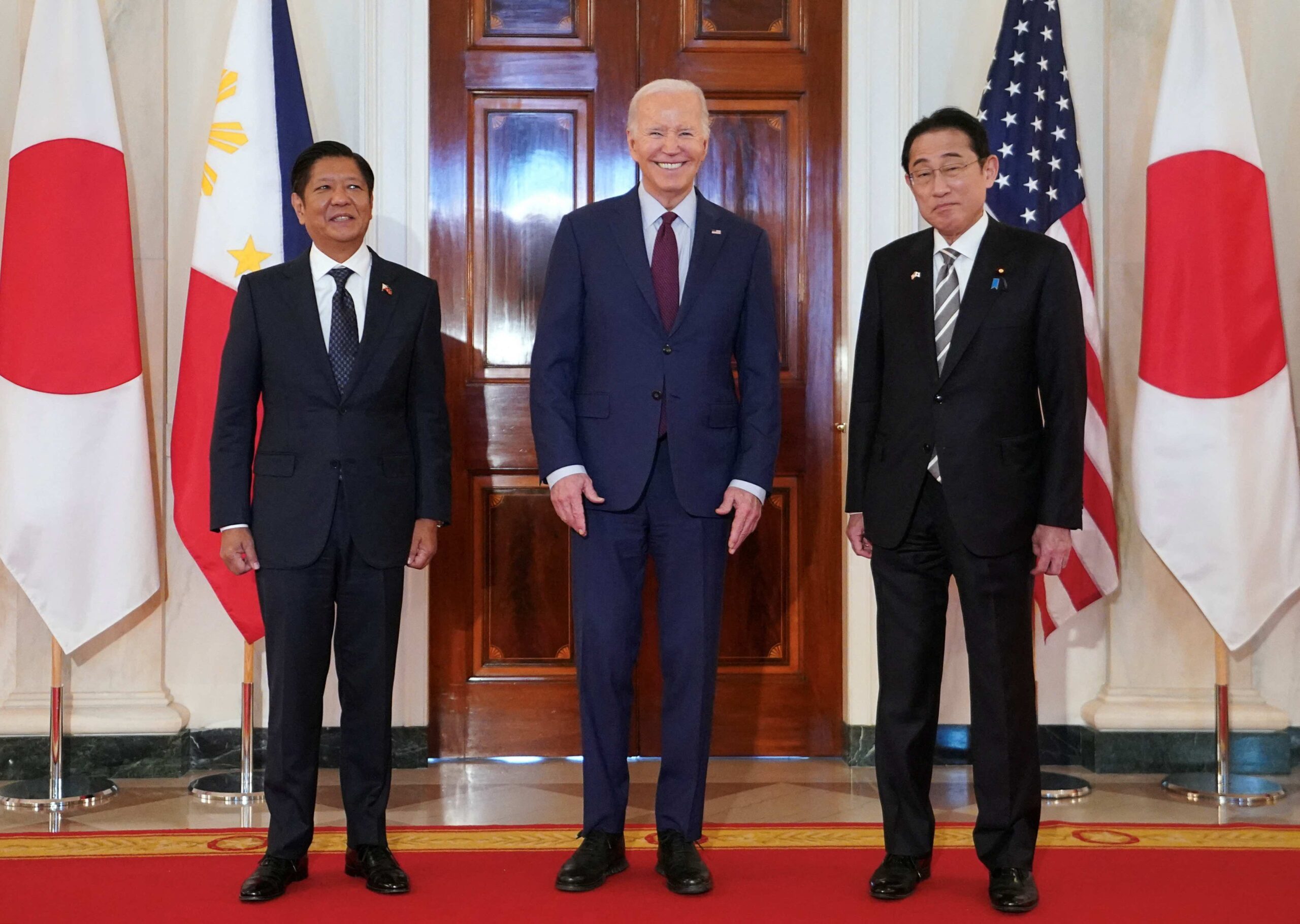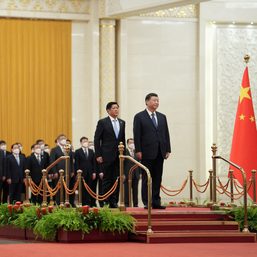SUMMARY
This is AI generated summarization, which may have errors. For context, always refer to the full article.

MANILA, Philippines – The Philippines on Thursday, April 18, called on China to “reflect upon its own actions in the South China Sea and the West Philippine Sea,” after Beijing claimed that the recent US-Japan-Philippines trilateral leaders summit only amps up tensions in the region.
“The trilateral cooperation is a partnership and a cooperative framework for the promotion of peace, stability and economic prosperity in the Indo-Pacific region. It is an admirable aspiration that should not be considered a threat by any peace-loving country,” the Department of Foreign Affairs said in a statement on Thursday, April 18.
“The source of tension in our region is well known to all. China should reflect upon its own actions in the South China Sea and the West Philippine Sea. It is China’s excessive maritime claims and aggressive behavior, including its militarization of reclaimed features, that are undermining regional peace and stability and raising tensions,” it added.
The DFA said that the “unwarranted references to the Cold War sensationalize the situation and misrepresent the peaceful purpose of the trilateral cooperation.”
“Nevertheless, those who wish to invoke the lessons of the past should also recall the need for adherence to the rule of law and how peace and stability has been maintained in our region through observance and respect for international law,” it added.
On April 12, or shortly after US President Joe Biden, Japan Prime Minister Kishida Fumio, and Philippine President Ferdinand Marcos Jr. met in the White House for the first leaders’ trilateral summit, Beijing said it “strongly opposes the practice of bloc politics by relevant countries.”
“We firmly oppose any acts that stoke and drive up tensions and harm other countries’ strategic security and interests. We are seriously against forming exclusive groupings in this region,” said Mao Ning, China’s foreign ministry spokesperson, in a press conference.
Japan and the Philippines have every right to develop normal relations with other countries, but they should not introduce bloc confrontation into this region, still less engage in trilateral cooperation at the expense of other countries’ interests,” Mao added.
Beijing also accused Washington of “[clinging] to the Cold War mentality” and “[threatening] other countries with its bilateral alliance treaties.” “Such moves seriously violate the UN Charter and undermine regional stability,” said Mao.
In a joint vision statement following the summit, Biden, Kishida, and Marcos expressed “serious concern” over Chinese actions both in the South China Sea and the East China Sea, bodies of water that separate China from the Philippines and Japan, respectively.
The US, Japan, and the Philippines specifically criticized Chinese actions in Ayungin Shoal or Second Thomas Shoal, where Chinese vessels regularly harass Philippine resupply missions to the BRP Sierra Madre. The three countries also slammed China for sending its ships to the waters off Senkaku Islands and making incursions into Japan’s territorial waters.
Both the Philippines and Japan are treaty-allies of the United States.
Marcos and his government have repeatedly said that dynamics in the South China Sea, as well as the Philippines’ policy in those waters, should not be seen solely through the lens of competition between superpowers China and the US.
Beijing has repeatedly framed the shift in the Philippines’ West Philippine Sea policy and strategy as a result of the US’ push. Manila again rejected that assertion in its April 18 statement.
“It is the sovereign choice and decision of the Philippines to strengthen our alliance with the United States and our strategic partnership with Japan, in accordance with our national interests and in line with our independent foreign policy. Our actions are in line with international law and complement our commitments in other regional and multilateral forums,” said the DFA.
It said that as the trilateral summit presents “another platform to further promote regional peace and security, it is only reasonable and responsible that the participants discuss regional security issues of mutual concern, challenges to the rule of law, and the peaceful resolution of outstanding disputes.”
“In the case of the South China Sea, the UN Convention on the Law of the Sea and the final and legally-binding 2016 Arbitral Award provide definitive lawful basis for the determination of the sovereign rights and jurisdiction within the Philippines’ maritime entitlements,” it added.
China claims almost all of the South China Sea, including parts in the Philippines’ exclusive economic zone. It also rejects the 2016 Arbitral Award, which, among other things, affirmed Manila’s position on its exclusive economic zone in the South China Sea.
Under Marcos, the Philippines has become more assertive in defending its sovereign rights, as well as asserting its sovereignty claims in the South China Sea. Its policy and strategy is a dramatic shift from previous president Rodrigo Duterte, who promised a “pivot” to China and agreed to a “status quo” in the West Philippine Sea.
That status quo, based on statements from Beijing, the Chinese embassy in the Philippines, and even former officials of the Duterte administration, meant the Philippines would not fortify the BRP Sierra Madre in Ayungin Shoal. Marcos had said that he would get to the bottom of the “secret agreement.” – Rappler.com
Add a comment
How does this make you feel?









There are no comments yet. Add your comment to start the conversation.